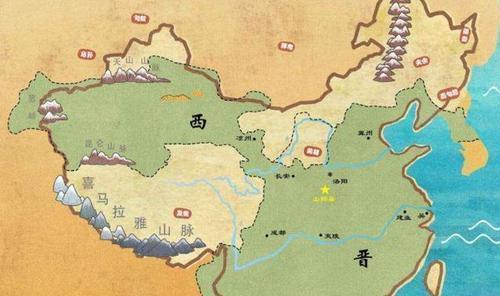
The answer is: Jin, divided into the Western Jin Dynasty and the Eastern Jin Dynasty. The story of the Three Kingdoms as we all know, after the Three Kingdoms, is the Jin Dynasty, after the end of the Jin Dynasty, it is the Southern and Northern Dynasties that we are familiar with.
Because the surname of the Jin Dynasty is Sima and everyone knows it, it is also known as Sima Jin in history. The Jin Dynasty was further divided into two periods, namely the Western Jin Dynasty (265-316) and the Eastern Jin Dynasty (317-420), collectively known as the "Two Jins", a total of 154 years.
The Western Jin Dynasty was founded by Sima Yan, the Emperor of JinWu, with its capital at Luoyang, and the Eastern Jin Dynasty by Sima Rui, the Emperor of the Jin Dynasty, with its capital at Jiankang (present-day Nanjing, Jiangsu Province). The political system of the two Jin Dynasties was the politics of the clan, and the political system transitioned from the three dukes and nine secretaries system of the Han Dynasty to the three provinces and six ministries of the Sui and Tang dynasties.
The Jin Dynasty originated from the Cao Wei clan in the Three Kingdoms period, and in 265, Sima Yan, the king of Jin, coerced the Wei Yuan Emperor Cao Yichan to give up the throne, changing the name of the country to "Jin", and the capital luoyang was for Emperor Wu of Jin, known as the Western Jin Dynasty.
In 280, the Western Jin Dynasty destroyed Sun Wu and unified the world, but the peaceful and stable situation lasted only a few decades. After Emperor Hui of Jin succeeded to the throne, the imperial court became increasingly chaotic, and the princes who had military power were in turmoil, which is known in history as the Rebellion of the Eight Kings.
After the Jin Dynasty was seriously injured, the foreigners who moved to the Central Plains outside the Country and inward took the opportunity to raise troops, resulting in a situation of Wuhu Chaos, and a large number of people and clans began to cross south. In 316, the Western Jin Dynasty fell, and the north entered the Period of the Five Hu and Sixteen Kingdoms.
Recent archaeological findings have shown that after the fall of the Western Jin Dynasty, both present-day Pyongyang, Korea, and Shincheon Commandery in Hwanghae Province, southwest of it, were loyal to the Jin Dynasty, and the Eastern Jin Dynasty was able to appoint Tong Shou as Changli, Xuanju, and Daifang Taishou, an area that used the Jin Dynasty era name at least until the third year of Yuanxing (404), before being annexed by Goguryeo.
In 317, sima Rui, a jin royal family, declared himself emperor in Jiankang, and the capital of Jiankang (present-day Nanjing) was the Emperor of Jin yuan, known historically as the Eastern Jin Dynasty, and held the territory of southern China. The clans and people of the Central Plains have successively moved south, forming a situation in which overseas Chinese and southern natives in North China live together. In the early days of the Eastern Jin Dynasty, Wang Dao and others adopted a calm and quiet strategy to stabilize the situation.
In 383, Former Qin dispatched a national division with the intention of destroying the Eastern Jin Dynasty. Faced with the calamity of the subjugation of the country, the Eastern Jin Dynasty monarchs single-mindedly established a victory with the Battle of Shuishui. Xie Xuan and other generals took advantage of the victory to pursue and successfully recovered a large number of lost lands, causing the collapse of Former Qin and triggering changes in the military and political pattern in the north.
In the end, Liu Yu rose, quelled the chaos, and seized the throne with military strength, and the founding name "Song" was for Emperor Wu of song, known as Liu Song in history, and China entered the period of the Southern and Northern Dynasties.
In fact, the entire Jin Dynasty was a period of decline in Chinese history, especially in cultural construction, so in the historical status of modern people, although the Jin Dynasty lasted a long time, it was not well known to the public.
The entire Jin Dynasty was a turbulent dynasty, so most of the scholars and literati at that time did not attach importance to morality, and Confucianism was at its most declining. At that time, the most prevalent was metaphysics, such as the "Seven Sages of the Bamboo Forest", which was still popular in alchemy at that time, and health maintenance and qigong were also vigorously developed at that time.
Moreover, the combination of metaphysics and Buddhism from India slowly changed into a situation of integration of Confucianism and Taoism during the Jin Dynasty, and by the later Southern and Northern Dynasties, Confucianism and Buddhism were even more in-depth, and Emperor Liangwu of the Southern and Northern Dynasties was still a monk.
And the Jin Dynasty also appeared a lot of faint emperors, such as The Jinwu Emperor, life is very luxurious, and he is very lustful, in order to facilitate his own selection of palace women, even in 273 banned the national marriage, after he destroyed Wu, and then sun Hao's harem of five thousand palace women directly into his harem, so that the harem at that time reached the scale of 10,000 people, far more than the harem we know as three thousand.
Film and television drama Jinwu Emperor